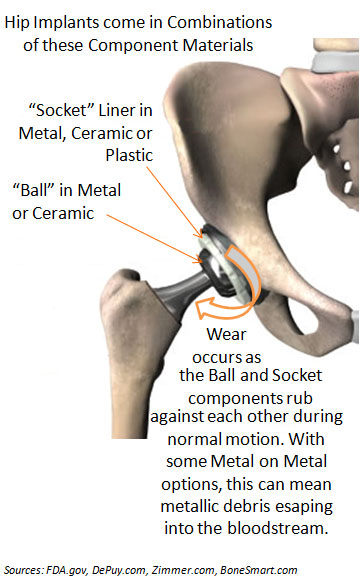 Top Class Actions
Top Class Actions
Do you have—or know someone who has—a DePuy metal-on-metal hip replacement? You may be interested in this—a class action lawsuit—filed against DePuy Orthopaedics, Inc., the manufacturer of metal-on-metal hip replacement implants. The lawsuit claims the devices cause “irreparable harm from undiagnosed metal disease.” And the purpose of the DePuy class action lawsuit is to get DePuy to pay for patients’ ongoing medical monitoring, which involves yearly orthopedic examinations, MRIs and blood and urine tests, according to the lawsuit.
Medical monitoring, you ask? Well, the science isn’t pretty, but the facts speak for themselves. According to an investigative report published in BMJ, formerly known as British Medical Journal, thousands of hip implants made by DePuy Orthopaedics have leaked high levels of toxic cobalt and chromium ions. These toxic metals have destroyed patients’ muscle and bone, and will potentially leave some patients with long-term disability, the study says.
“Metal-on-metal hip prostheses like the DePuy ASR XL can and do create three to five-fold increases in blood levels of the heavy metals chromium and cobalt,” the lawsuit states. “Toxicity from these metals causes metallosis, a disease that destroys the tissues surrounding the artificial joint. Left unresolved, metallosis creates irreparable harm to the patient from the progressive destruction of the joint tissues.”According to the court document, other health issues related to failure of the ASR XL hip implant include “immediate irreparable harm from undiagnosed metal disease and the effect it has on the joint, even after revision and on other targeted organs, such as the brain, heart, liver, and kidneys.”
Sadly, there’s more. In addition to risk of infection and blood clots in a second implant surgery, revisions will not last as long as the 20 to 30 years the original hip implants were expected to last.
The BMJ report cites longstanding “evidence of risk from metal-on-metal hips, the manufacturers’ inadequate response, and how regulatory bodies failed to give doctors and patients the information they need to make informed decisions.”
The US Food and Drug Administration (FDA) warned in 2011 about metal ions that shed minute particles of the metal implant that migrate into the bloodstream and damage bone or tissue surrounding the implant and joint.
BMJ quotes an internal DePuy memo from July 2005 that says, “In addition to inducing potential changes in immune function, there has been concern for some time that wear debris may be carcinogenic… One study suggested threefold risk of lymphoma and leukemia 10 years after joint replacement.”
“So-called ‘Silent Metal Disease,’ is found in upwards of 30% of patients with no symptoms. Cobalt and chromium poisoning can only be diagnosed promptly through a program of universal and comprehensive monitoring of the entire population of ASR XL patients,” according to the lawsuit.
BMJ says it’s likely there are more than 500,000 “at risk large diameter” metal-on-metal hips implanted in American patients since 2003 which require monitoring.
The lawsuit is asking that a class be certified and that DePuy be ordered to establish a fund to pay the costs of medical monitoring over the lifetime of all ASR XL Acetabular System hip implant patients. Those costs include annual blood and urine tests and medical imaging such as ultrasound and MRI examinations.
These shoes were made for walking–or not–according to this class action. This isn’t the first time we’ve seen complaints from consumers over reportedly false claims made by toning shoes manufacturers. This week, a consumer fraud class-action lawsuit was filed on behalf of consumers bought Skechers, alleging misleading advertising influenced people’s decision to buy the company’s “Shape-Ups” toning shoes.
The Skechers “Shape-Ups” toning sneaker class action lawsuit seeks money damages for consumers who paid a “premium price” for Skechers “Shape-Ups” based on TV, print and Internet ads that touted the toning shoes’ health benefits.
In reality, the complaint alleges, the shoes provide no additional health benefits. Instead, they pose a risk of injury due to their pronounced rocker bottom sole, according to the complaint.
The lawsuit seeks money damages and an order that would stop Skechers from “deceptive and unlawful advertising.”
According to the lawsuit, the shoes are marketed, sold and promoted by Skechers, U.S.A., Inc., and its subsidiaries.
The complaint states that Skechers is currently being investigated for its toning shoes marketing claims by the Federal Trade Commission. In September, the FTC reached a $25 million settlement with Reebok for making similar fitness claims about its own brand of toning shoes, the lawsuit states. Footwear News estimates that Skechers will face a fine of $75 million.
In particular, the lawsuit alleges that Skechers promoted that its “Shape-Ups” would provide health benefits “without setting foot in a gym.”
However, the plaintiffs claim, the company has produced no valid scientific proof that the toning shoes provide any greater benefit than regular athletic shoes.
The complaint cites an American Council on Exercise study that concluded, “There is simply no evidence to support the claims that these shoes will help wearers exercise more intensely, burn more calories or improve muscle strength and tone.”
However, the lawsuit alleges, the shoes do pose health risks. Because the rocker bottom soles create instability and change gait mechanics, they can trigger chronic injuries and cause wearers to fall and suffer injuries, the plaintiffs claim.
An attorney representing the plaintiffs notes a May 2011 Consumer Reports article stating that toning shoes had produced more injury reports than any other product in its database. The reported injuries included tendinitis and foot, leg and hip pain. The more severe reported injuries included broken bones. Looks like it’s back to the gym after all…
Top Settlements
Remember Mayberry RFD? “America’s Happiest Hamlet,” according to the trailer. Well, there’s something of that sentiment about this settlement. Maybe because the good guys won after all. Finally, after almost 10 years of litigation, a settlement in the Orange County Register unpaid wages class action lawsuit (Gonzalez, et al. v. Freedom Communications, Inc., et al., Orange County Superior Court, Case No. 03CC08756) has been reached.
In the settlement, the directors and officers of Freedom Communications, the parent of the OC Register, agreed to pay $15.5 million—in addition to an earlier $14.5 million paid in 2010—to resolve the paper carriers’ class action against the OC Register. The final $30 million settlement brings closure to litigation that had been ongoing for nearly a decade.
The California labor class action case was initially filed in the Orange County Superior Court in 2003 and then proceeded through the litigation process, culminating in seven weeks of jury trial before it was settled in January of 2009 for $38 million. While the plaintiff newspaper carriers won the battle, Freedom filed bankruptcy on September 1, 2009 and sought to eliminate this obligation through bankruptcy one week before the agreed payment date.
OK—Happy Friday everyone—See you at the bar!


 So much for the lazy days of summer—it’s been a busy week!
So much for the lazy days of summer—it’s been a busy week! Top Class Actions
Top Class Actions Top Class Actions
Top Class Actions